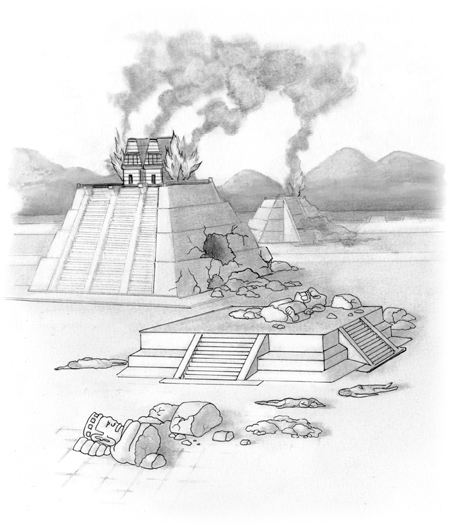
As they observed the daily life of the Aztecs, the young Spanish soldiers were shocked to witness the spectacle of human sacrifice. “This must stop!” they protested to Emperor Montezuma.
“These visitors are troublemakers!” the Aztec priests insisted. “Everyone knows that if we stop offering blood to the sun god, the world will end! If these Europeans enjoy daily sunshine, it is only because we are getting the sun god to rise! They should be grateful to us!”
The Spanish men, who had been chosen for Cortes’ voyage because of their extraordinary courage and valor, had been raised and educated in a Christian culture. “We were born into noble families in which honor, respect for others, dignity and love reign,” they told each other. “We cannot let this horror continue!”
The Spaniards were hot-tempered whenever honor was offended. “Respect is something to which every person has a right by birth, by virtue of being a child of God,” they insisted. “But to act like this is to lose all claims to respect.”
The Spanish soldiers became sick with outrage. “We have been taught to fight battles for causes we understand, but you make yourselves evil by this senseless spilling of innocent blood!” they told the Aztecs. “You are acting less than human!” The Spaniards decided they had to stop the massacres at any cost.
Few of the Indians who had joined the Spaniards had ever even been inside the city of Tenochtitlan. “It is the fearsome place of execution!” they exclaimed. Now that they were witnessing the sacrificial rituals, they too were beside themselves with anger. “Peace is impossible without drastic action!” they cried.
Fights broke out throughout the city, each side feeling justified in murdering the other.
The remaining 400 Spaniards and 5,000 Indians, all guests of Montezuma, vented their hatred, and the Aztecs, taught to be fierce and unforgiving, never yielded.
Meanwhile, Cortes and the soldiers who were with him staged a sneak attack by night on the 1,000 men who had been sent by Velasquez to capture him as a traitor. When these new conquistadors heard what Cortes had found in Mexico, they shifted their allegiance from Velasquez to Cortes and marched back to Tenochtitlan with him. Thousands lay dead by the time the new army arrived. The 175-year-old city was being toppled. Three-quarters of the Spanish soldiers had already been killed. Others had been taken prisoner. Those Aztecs who had been opposed to Montezuma from the beginning, and who resented his friendliness to the foreigners, took this chaotic opportunity to murder the emperor. The reign of Montezuma had come to an end.
The greatest outrage and offense to the Spaniards had also occurred. Some of the men, for whom Cortes had vowed personal responsibility to their families, had been dragged onto pagan altars and sacrificed to gods that existed only in the imaginations of their Aztec executioners. Cortes saw this horror as nothing short of offering homage to the devil. “I will destroy the city of Tenochtitlan!” he vowed.
In a fury fueled by revenge and a sense of justice, Cortes and his fresh recruits joined in the attack upon Tenochtitlan. They killed without mercy. They leveled the temples. They snatched up any riches they could find.
Tenochtitlan was being toppled.
Once they had retreated to a safe place outside the city, Cortes dropped beneath an ancient cedar tree and wept. “I have conquered the Aztecs,” he said, “but at what a price! Four hundred fifty of my valiant men and 4,000 of our native allies are dead!”
Cortes handed over to the care of the Franciscans those Aztecs who remained in the city. Bishop Zumarraga told his friars, “As heartsick as we are over this enormous tragedy, we must respond with generous love so that we may help heal not only our own people, but the poor Aztecs who have lost home, family, friends, and religion in one blow!”
The entire event had disgusted the Spaniards and caused further divisions among them. The Indians of Mexico, of course, were still divided. Conditions were ripe for more war, and at every turn treachery and danger lurked.
Bishop Zumarraga and the friars prayed to the Blessed Virgin Mary, “Dear Mother of God, help us!” Will my sign ever come? the bishop wondered. The native people resist our teaching more and more! And who could blame them? “Lord, do not abandon these other children of yours!” he prayed.
The bishop could not have known it, but the moment for the great miracle of the Americas had arrived!